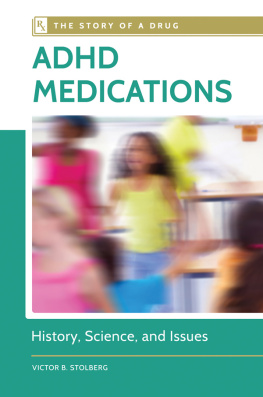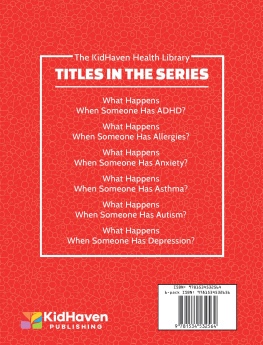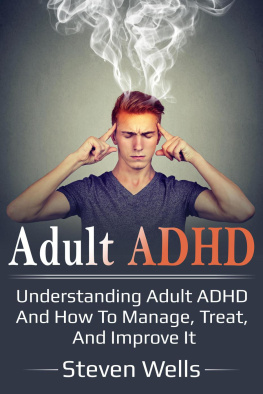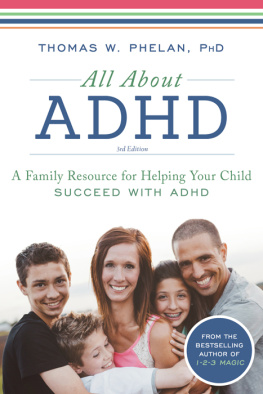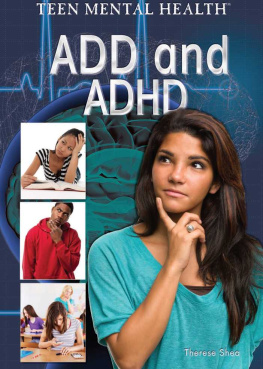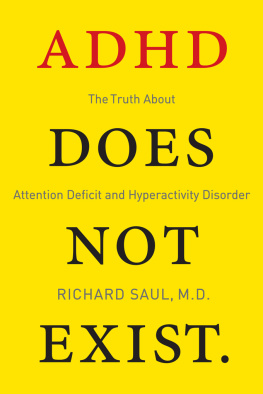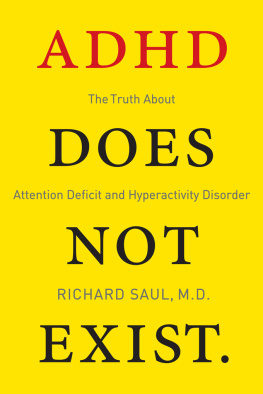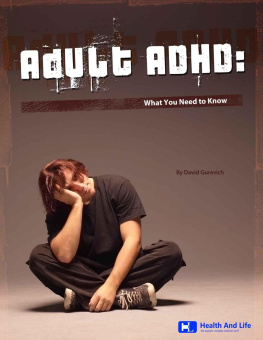The Story of a Drug
Painkillers: History, Science, and Issues
Victor B. Stolberg
Antipsychotics: History, Science, and Issues
Jeffrey Kerner and Bridget McCoy
Steroids: History, Science, and Issues
Joan E. Standora, Alex Bogomolnik, and Malgorzata Slugocki
Vaccines: History, Science, and Issues
Tish Davidson
ADHD Medications
HISTORY, SCIENCE, AND ISSUES
Victor B. Stolberg
The Story of a Drug

Copyright 2017 by ABC-CLIO, LLC
All rights reserved. No part of this publication may be reproduced, stored in a retrieval system, or transmitted, in any form or by any means, electronic, mechanical, photocopying, recording, or otherwise, except for the inclusion of brief quotations in a review, without prior permission in writing from the publisher.
Library of Congress Cataloging-in-Publication Data
Names: Stolberg, Victor B., author.
Title: ADHD medications : history, science, and issues / Victor B. Stolberg. Description: Santa Barbara : Greenwood, [2017] | Series: Story of a drug | Includes bibliographical references and index.
Identifiers: LCCN 2017027300 (print) | LCCN 2017029382 (ebook) | ISBN 9781610697262 (ebook) | ISBN 9781610697255 (hardcopy : alk. paper)
Subjects: | MESH: Attention Deficit Disorder with Hyperactivitydrug therapy | Drug Therapyhistory | Drug-Related Side Effects and Adverse Reactions
Classification: LCC RC394.A85 (ebook) | LCC RC394.A85 (print) | NLM WS 350.8.A8 | DDC 616.85/89061dc23
LC record available at https://lccn.loc.gov/2017027300
ISBN: 9781610697255 (print)
9781610697262 (ebook)
21 20 19 18 17 1 2 3 4 5
This book is also available as an eBook.
Greenwood
An Imprint of ABC-CLIO, LLC
ABC-CLIO, LLC
130 Cremona Drive, P.O. Box 1911
Santa Barbara, California 93116-1911
www.abc-clio.com
This book is printed on acid-free paper 
Manufactured in the United States of America
This book discusses treatments (including types of medication and mental health therapies), diagnostic tests for various symptoms and mental health disorders, and organizations. The authors have made every effort to present accurate and up-to-date information. However, the information in this book is not intended to recommend or endorse particular treatments or organizations, or substitute for the care or medical advice of a qualified health professional, or used to alter any medical therapy without a medical doctors advice. Specific situations may require specific therapeutic approaches not included in this book. For those reasons, we recommend that readers follow the advice of qualified health care professionals directly involved in their care. Readers who suspect they may have specific medical problems should consult a physician about any suggestions made in this book.
It is my pleasure to dedicate this book to my family, particularly my wife, Marie Rose, and our two sons, Victor and George, for their encouragement, support, and, most of all, tolerance during my work on this project.
Contents
Series Foreword
Many books have been written on recreational drug useits medical consequences, history, impact on the criminal justice system, and many other important facets of this complex issue. But recreational illegal drugs are not the only drugs Americans use.
In fact, while approximately 10 percent of Americans are illicit drug users, a staggering 70 percent of Americans regularly take at least one prescription drug. And almost everyone has taken at least one prescription or over the counter (OTC) medication at some point in their lives. There are hundreds of therapeutic drugs to address all manner of physical and psychological conditions and diseases, from destroying harmful bacteria to relieving pain to managing feelings of anxiety or depression. These drugs can have a powerful impact on the human body, but they can have larger economic and societal effects as well. Prescription and OTC drugs are a multibillion dollar industry, and the abuse of certain prescription medications has become a major public health concern.
Yet, despite these medications prevalence, importance, and potential for abuse, few books have been written about them. This series, The Story of a Drug, aims to tell the untold tale behind many of these drugs. Each volume in the series explores a major class of drugs, examining them from a variety of perspectives, including medical, economic, legal, and cultural.
To maximize clarity and consistency, each book in the series follows the same format. Each begins with a fictional case study to illustrate the significance of the books subject matter, highlighting key concepts and themes that will be explored elsewhere in the text. speculates on the drugs possible future, including emerging controversies and trends in research and use.
Each volume in this series also features a glossary of terms and a collection of print and electronic resources for additional information and further study.
It is our hope that the books in this series will not only provide valuable information but also spur informed discussion and debate about these drugs and the many issues that surround them. For instance, are antibiotics being overprescribed leading to the development of drug-resistant bacteria? Should antipsychotics, usually used to treat serious mental illnesses such as schizophrenia and bipolar disorder, be used to render inmates and elderly individuals with dementia more docile? Do schools have the right to mandate vaccination for their students, against the wishes of some parents?
As a final caveat, please be aware that the information presented in these books is no substitute for consultation with a licensed health care professional. These books do not claim to provide medical advice or guidance.
Peter L. Myers, PhD
Emeritus member, National Addiction Studies Accreditation Commission
Past President, International Coalition for Addiction Studies Education
Editor-in-Chief Emeritus, Journal of Ethnicity in Substance Abuse
Preface
This work reviews much of what is known about Attention Deficit Hyperactivity Disorder (ADHD) and ADHD medicines. It covers the history of ADHD, the etiology of ADHD, the symptoms of, the major variants of, and the usefulness of various treatments, including chiefly that of the varied ADHD medicines and of the related nonpharmacological supportive approaches.
The first chapter of this book presents a case history of ADHD in the life of one individual and his family. This selection is intended to present a more intimate feeling of how ADHD can play out in the lives and experiences of an individual with ADHD and of their families and close associates. ADHD very often persists into adolescence and adulthood as it does in our case study. Without diagnosis and treatment, an individual with ADHD, like the one in the opening chapter, is highly likely to experience inner difficulties in school and in other areas of their life. Earlier initiation of treatment not only helps the individual perform better in academic and work settings but can also help to avoid the feelings of anxiety and depression typically associated with the difficulties often experienced by those with ADHD, including the unpopularity with their peers, and conflicts with parents, teachers, and other figures of authority.

